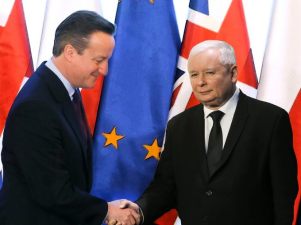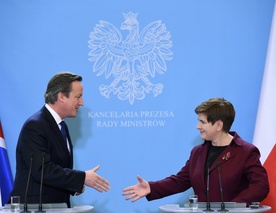Polish government’s broken promises on British benefits deal: pragmatism or betrayal?

David Cameron meets Jaroslaw Kaczynski (Pawel Supernak/PAP)
By Daniel Tilles
By apparently agreeing to David Cameron’s proposal to restrict benefits for EU migrants in the UK, Poland’s government has made a dramatic reversal on its earlier declarations that it would never accept such discrimination against Polish citizens. Daniel Tilles asks whether this U-turn is the result of a pragmatic compromise or if, instead, the ruling Law and Justice (PiS) party has used the rights of its countrymen as bargaining chip to gain concessions from the British that advance its own political agenda.
As I’ve written in these pages previously, a particular concern in Britain stemming from the unprecedented wave of immigration during the last decade has been over ‘benefit tourism’: the idea that some migrants are coming not to work, but to take advantage of the country’s generous welfare system. Such accusations have been directed in particular against Poles, who make up the largest group among recent European immigrants and who, as EU citizens, are legally entitled to receive benefits on the same basis as British natives.
That Britain’s government has taken up this campaign against alleged Polish benefit tourists is little more than populist pandering. It is unfair: anyone who works, pays taxes and contributes to the British economy should have the same right as others to claim benefits. It is poorly targeted: EU immigrants generally, and Polish immigrants in particular, are more likely to work and less likely to claim benefits than just about any other group in Britain (including – indeed especially – the natives). It is pointless: there is little chance it will deter future immigrants, which is supposedly its purpose. And it is potentially counterproductive: cutting child benefits for overseas children, for example, will encourage some parents to bring them to the UK, thereby increasing costs for British taxpayers.
However, for a long time, it looked as though none of this would really matter. Any attempt to restrict benefits for EU migrants would violate European law, and would therefore require the assent of other EU member states – something that Poland, both under its previous and current government, has long made clear it would not agree to.

President Duda tells the BBC is he ‘completely against discrimination’
In December, President Andrzej Duda told the BBC that he is ‘completely against…contravening…the principles of non-discrimination’ when it comes to benefits. Last month, the Polish foreign ministry issued a statement in which it made clear that it ‘unequivocally opposed’ any discriminatory ‘cut in social benefits for out countrymen in the UK’. A Polish official told the Financial Times that restricting benefits was a ‘red line’ Poland was not prepared to cross, and just last week, the Europe minister, Konrad Szymański, repeated the mantra that Poland ‘can’t accept discrimination’.
A Big U-Turn
Given such unambiguous statements, one would therefore expect that when European Council President Donald Tusk recently published a draft agreement to reform the UK’s relationship with the EU, one of its central planks would be completely unacceptable to the Polish government. This is the introduction of a so-called ‘emergency brake’, which would allow Britain to temporarily restrict benefits for EU migrants. Yet in fact, the details that have subsequently emerged suggest that, in direct contradiction to their earlier declarations, Poland’s leaders are prepared to accept such discriminatory measures against Polish workers in the UK.

Beata Szydlo meets Cameron in Warsaw last week (Radek Pietruszka/PAP)
Following a meeting with Cameron in Warsaw last week, Jarosław Kaczyński, PiS’s chairman, declared that he had secured ‘full protection for all those [Poles] who are in Britain at the moment’, who will ‘continue to receive benefits’. The fact that he mentioned only those in Britain already, and not future migrants, indicates that Poland will not stop Britain from discriminating against the latter. Similar language was used by a government spokesman, as well as by the foreign minister, Witold Waszczykowski, who noted that any changes would ‘not apply to those Poles already living in the UK’, and are only ‘aimed at the future’. After her own meeting with Cameron, Prime Minister Beata Szydło, said that that just a few issues ‘need to be ironed out’ with regard to the proposed emergency brake.
Make no mistake, whatever positive spin the government puts on it, this is a big U-turn. The rights of Poles already in the UK were never really in question: Britain is only proposing to limit benefits for migrants during their first four years in the country; by the time the measures come into force, almost all Poles currently in the UK will have been there long enough not to be affected. So PiS’s claim that it has secured protection for existing Polish emigrants is almost meaningless (and, in fact, Kaczyński revealed that he had actually agreed to accept an ‘adjustment’ – i.e. reduction – in child benefits for UK-based Poles whose children remain in Poland).
The significant part of the agreement is that the government has agreed to discrimination against future Polish migrants, who will receive lower benefits than the native population. This is wrong in principle (as PiS itself has repeatedly argued) and will make life harder in practice for Polish workers. Of course, the overwhelming majority of Poles migrate to work, not to claim benefits; but losing access to potentially thousands of pounds a year in welfare will have a big impact on individuals and families. Moreover, it is highly likely that other rich EU countries will also want to take advantage of the new emergency-brake mechanism, meaning that Poles going to places like Germany, Sweden or the Netherlands could also be adversely affected.
Why the change?
The big question is why the Polish government has reneged on its earlier promises. There appear to be three possibilities (which are not mutually exclusive, and may all have played some part):
- Their strong stance on opposing discrimination was always a negotiating tactic, designed to win a better deal for Poland.
- That stance was genuine, but had to be partially abandoned on pragmatic grounds. There is growing support in Britain for an exit from the EU. Such an outcome would be potentially very damaging for Polish migrants in the UK, as they would face greater restrictions not just on benefits, but even on their right to live and work in the country. In this light, Poland’s government accepted that David Cameron needs some kind of concession on benefits to discourage Brits from voting to leave the EU in a referendum later this year.
- The Polish government sees the benefits issue as a bargaining chip, and is prepared to give in to British demands on this issue in exchange for support in other areas.
Much of the evidence points to the last of these possibilities. In the build up to Cameron’s Warsaw visit, a high-level source told the Daily Telegraph that, while Polish politicians liked to publicly ‘kick up a fuss’ about opposing discrimination in order to ‘reassure domestic public opinion’, in private they had indicated a willingness to accept British demands. This is because they actually regard it as being in Poland’s interest to discourage citizens from emigrating. Moreover, they see an opportunity to exploit the benefits issue for their own political gain, using it to extract support from the British on beefing up NATO’s eastern flank, propping up Poland’s inefficient coal-mining industry, and on PiS’s conflict with the EU.

British troops take part in a NATO training exercise in Poland last year (PA)
This speculation appears subsequently to have been confirmed. Following his meeting with Cameron, Kaczyński declared that he had ‘obtained full understanding’ regarding Poland’s dispute with the European Commission and on increased military cooperation. The Financial Times’ Warsaw correspondent, having spoken to Polish officials involved in the negotiations, reported that Cameron had ‘won over [Poland] to curb EU migrant benefits…with pledges of military support, political blandishments and concessions’.
It also doesn’t seem coincidental that Britain recently announced plans to permanently station 1,000 military personnel in Poland, while it is a British Conservative, Syed Kamall, who has been the most prominent defender of the Polish government in the EU. It all looks very much like a quid pro quo between PiS and the Tories, who share a relatively similar ideological outlook (especially when it comes to the EU) and sit in the same European political alliance.
What makes this apparent agreement all the more significant – and controversial – is the fact that, although boosting NATO’s defences in Poland would be in the national interest, securing British support in PiS’s current squabble with the EU is primarily of benefit only to the party itself. Thus – while we won’t know for sure until the final details emerge – it appears very much as though PiS has not only accepted precisely the discrimination against Poles that it previously declared to be unacceptable, but it has done so, at least in part, for its own narrow political gain.
.![]()

Poland should have gotten as much as possible out of Britain. The reality is that given the large Polish presence in Britain, portions of the country should be immediately placed under Polish administration. As we know, Britain has been constantly occupied by the Angles Saxons and Normans for a millennium – it is time to bring the country under a PiS government.